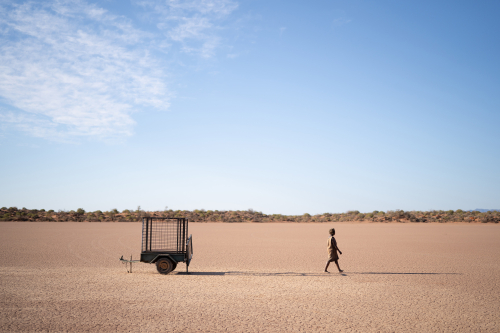
Triptych Pictures
MOVIE REVIEW
The Survival of Kindness (2022)
This is one of a very few movies that is without language (absolutely not the same thing as being silent), which means “The Survival of Kindness” is to be recommended on that basis alone. The lack of language is a crucial part of the film's message, which is about the brutality of racism, especially as that manifests in Australia. And for the most part it works extremely well, until it doesn't.
The shocking opening sequence is as strong as anything that's been made lately: A diorama of masked people destroying a village of people of color is proved to be decoration on a cake, which is cut and served to a group of murmuring people wearing gas masks. Outside the party there's an unmasked black woman (Mwajemi Hussein, who carries the film with ease) in a cage on a trailer hitch. She whimpers and cries, but no one pays attention. Later the trailer is taken to the middle of a dried-out lakebed and abandoned. Fortunately the woman makes her escape (after much struggle, by getting the locked door off the hinges) and makes her way into the world. Eventually we learn the gas masks are needed to prevent catching a fatal disease which first leaves you with horrible facial sores. And if you take off your mask to reveal a nonwhite face underneath, most people shoot you on sight.
The movie's hard lessons are subtly but constantly reinforced. Bodies are dug up or cut down so the shoes they're wearing can be stolen. The woman finds a discarded pair of gloves, with a pair of severed hands still wearing them. She receives her gas mask when one is thrown to her by a man running for his life; from her hiding place she hears the shots. At one point she finds a body with its trousers down and nearby a seated white man coughing up blood in his last moments. The murderer is a screaming indigenous woman in a bloodied dress; no further picture needs to be painted. But all of these discoveries, and the communication between everyone, is made without words. Grunts, pointing, babbling, screams, sighs, sure. But the unspecified catastrophe that has brought everyone to this has almost made spoken language obsolete. Only what can be expressed through body language matters anymore. Only the body matters anymore.
That is, until a short woman in a yellow raincoat (Deepthi Sharma) saves the woman's life. It turns out she's a teenager living with her slightly older brother (real-life sibling Darsan Sharma) in a disused train yard, and you can guess by the names of the actors that they aren't white either. But they do have cases of stage makeup and colored contact lenses, which means they can risk venturing out in public under their gas masks as long as their hands and neck are covered. All three are thrilled to have found each other. Unfortunately utopia, even one with a model train set, never lasts long.
Writer-director Rolf de Heer has made a career speciality of putting middle fingers up to Australian racism, but this is the first time he has ventured into parable, which is obviously why the movie was shown at the Berlinale. Despite the relentless horror, it is jaw-droppingly beautiful, shot mainly in Tasmania, with Maxx Corkindale's cinematography and Adam Dixon-Galea’s sound taking in the full scope of the natural world as the woman goes on her wordless journey. The trouble is this is so bleak, and the third act so remorselessly grim, that's it difficult to understand the purpose of this exercise. Are we truly meant to think racism is a scourge from which we'll never be free? Is hope an emotion only for children, while the rest of us must focus on brute survival at any price? And why undermine the whole point of the title with the brutal final twist, a nightmarish choice that tips the film from catastrophe to cataclysm? For this “The Survival of Kindness” is tough to recommend, which is such a shame because its gorgeous depiction of a world beyond language, no matter how brutal that world is, is worth it for that conceit alone.
Comments